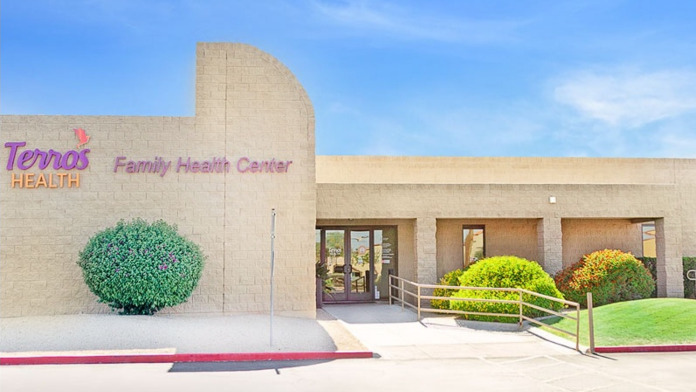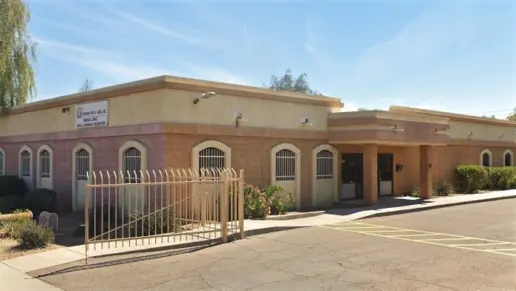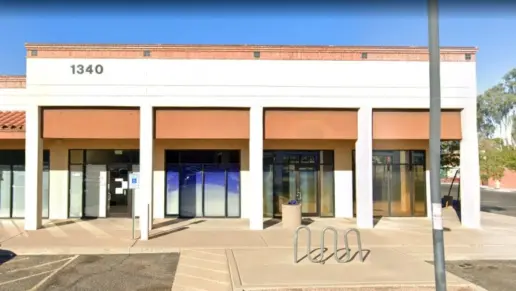Some positive stuff is the good therapists and the wide waiting room that's not congested the majority of the times. Negative aspects are that they do not keep their facility clean, cleaning staff makes this experience frustrating for people like me that want a tidy environm ...
About Terros Health – Stapley Health Center- Primary Care
The comprehensive substance use treatment services provided by Terros Health - Stapley Health Center - Primary Care in Mesa, Arizona, are customized to meet your needs. Their outpatient services will support you during your recovery process.
One essential element is group therapy which offers a calming setting that promotes community healing and skill development. You may also engage in individual counseling in your treatment plan if you need more help.
For those who have finished an intensive outpatient program (IOP) or have relapsed there is a program called the supportive outpatient program. For an average of 12 weeks, the program’s participants attend two weekly group sessions that emphasize reintegration into daily life and skills.
Their IOP is especially designed to assist you with withdrawal. There are both day and evening options for the three-hour weekly group sessions. These meetings of eight to 12 participants make use of research proven therapeutic approaches. These include 12 Step principles, experiential techniques, dialectical behavior therapy and cognitive behavioral therapy. IOP typically lasts 12 weeks, and you will see your therapist for an hour every week in addition to group sessions. There are weekly relapse prevention groups available for people who are not in the IOP but are looking for help preventing relapses.
Staff can collaborate with outside organizations such as justice services. They assist in the coordination of care for those with court ordered treatment plans. Their employees are knowledgeable about the prerequisites and recommended procedures for handling these procedures.
Medication assisted treatment (MAT) is available for people who are craving or withdrawing from alcohol and opiate based drugs. Problems related to heroin, fentanyl and prescription painkillers are addressed by this program. Medications include drugs like Suboxone, Subutex, Vivitrol and Narcan. Pregnant women and teenagers are among the diverse populations served by this program.
Latest Reviews
Gallery

Location
Accepted Insurance


Other Forms of Payment
Private insurance refers to any kind of healthcare coverage that isn't from the state or federal government. This includes individual and family plans offered by an employer or purchased from the Insurance Marketplace. Every plan will have different requirements and out of pocket costs so be sure to get the full details before you start treatment.
Self-pay involves paying for treatment out of your own pocket. You can use savings or credit, get a personal loan, or receive help from family and friends to fund your treatment. If you don't have insurance or your insurance plan doesn't cover a specific program, self-pay can help ensure you still get the care you need.
Financial aid can take many forms. Centers may have grants or scholarships available to clients who meet eligibility requirements. Programs that receive SAMHSA grants may have financial aid available for those who need treatment as well. Grants and scholarships can help you pai for treatment without having to repay.
Medicare is a federal program that provides health insurance for those 65 and older. It also serves people under 65 with chronic and disabling health challenges. To use Medicare for addiction treatment you need to find a program that accepts Medicare and is in network with your plan. Out of pocket costs and preauthorization requirements vary, so always check with your provider.
Medicaid is a state based program that helps lower-income individuals and families pay for healthcare. Medicaid covers addiction treatment so those enrolled can use their coverage to pay for rehab. When a program accepts Medicaid the client often pays very little or nothing out of their own pocket.
Military members, veterans, and eligible dependents have access to specific insurance programs that help them get the care they need. TRICARE and VA insurance can help you access low cost or no cost addiction and mental health treatment. Programs that accept military insurance often have targeted treatment focused on the unique challenges military members, veterans, and their families face.
Addiction Treatments
Levels of Care
Treatments
Many of those suffering from addiction also suffer from mental or emotional illnesses like schizophrenia, bipolar disorder, depression, or anxiety disorders. Rehab and other substance abuse facilities treating those with a dual diagnosis or co-occurring disorder administer psychiatric treatment to address the person's mental health issue in addition to drug and alcohol rehabilitation.
Mental health rehabs focus on helping individuals recover from mental illnesses like bipolar disorder, clinical depression, anxiety disorders, schizophrenia, and more. Mental health professionals at these facilities are trained to understand and treat mental health issues, both in individual and group settings.
Programs








Clinical Services
Cognitive Behavioral Therapy (CBT) is a therapy modality that focuses on the relationship between one's thoughts, feelings, and behaviors. It is used to establish and allow for healthy responses to thoughts and feelings (instead of unhealthy responses, like using drugs or alcohol). CBT has been proven effective for recovering addicts of all kinds, and is used to strengthen a patient's own self-awareness and ability to self-regulate. CBT allows individuals to monitor their own emotional state, become more adept at communicating with others, and manage stress without needing to engage in substance abuse.
Whether a marriage or other committed relationship, an intimate partnership is one of the most important aspects of a person's life. Drug and alcohol addiction affects both members of a couple in deep and meaningful ways, as does rehab and recovery. Couples therapy and other couples-focused treatment programs are significant parts of exploring triggers of addiction, as well as learning how to build healthy patterns to support ongoing sobriety.
Research clearly demonstrates that recovery is far more successful and sustainable when loved ones like family members participate in rehab and substance abuse treatment. Genetic factors may be at play when it comes to drug and alcohol addiction, as well as mental health issues. Family dynamics often play a critical role in addiction triggers, and if properly educated, family members can be a strong source of support when it comes to rehabilitation.
Group therapy is any therapeutic work that happens in a group (not one-on-one). There are a number of different group therapy modalities, including support groups, experiential therapy, psycho-education, and more. Group therapy involves treatment as well as processing interaction between group members.
In individual therapy, a patient meets one-on-one with a trained psychologist or counselor. Therapy is a pivotal part of effective substance abuse treatment, as it often covers root causes of addiction, including challenges faced by the patient in their social, family, and work/school life.
Trauma therapy addresses traumatic incidents from a client's past that are likely affecting their present-day experience. Trauma is often one of the primary triggers and potential causes of addiction, and can stem from child sexual abuse, domestic violence, having a parent with a mental illness, losing one or both parents at a young age, teenage or adult sexual assault, or any number of other factors. The purpose of trauma therapy is to allow a patient to process trauma and move through and past it, with the help of trained and compassionate mental health professionals.
Amenities
-
Residential Setting
-
Private Rooms
Contact Information
1111 South Stapley Drive
Mesa, AZ 85204


